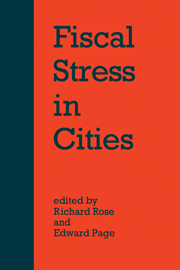Book contents
- Frontmatter
- Contents
- Acknowledgments
- 1 Can Government Control Itself?
- 2 Pressures in Whitehall
- 3 Pressures from Whitehall
- 4 The Decline of Urban Economies
- 5 Local Government as an Employer
- 6 Do Fewer Pupils Mean Falling Expenditure?
- 7 Local Autonomy and Intergovernmental Finance in Britain and the United States
- 8 Chronic Instability in Fiscal Systems
5 - Local Government as an Employer
Published online by Cambridge University Press: 07 October 2011
- Frontmatter
- Contents
- Acknowledgments
- 1 Can Government Control Itself?
- 2 Pressures in Whitehall
- 3 Pressures from Whitehall
- 4 The Decline of Urban Economies
- 5 Local Government as an Employer
- 6 Do Fewer Pupils Mean Falling Expenditure?
- 7 Local Autonomy and Intergovernmental Finance in Britain and the United States
- 8 Chronic Instability in Fiscal Systems
Summary
The labour force is important in local government, most obviously because wages represent by far the largest cost which local authorities have to bear. Moreover, it is very difficult to reduce the labour force substantially by substituting capital, since in most local government services, such as education, social work and police, the activity of the labour force is the service to the public. Furthermore, local government is obligated to act as a good employer (Beaumont 1981); thus the 1946 charter for the local government service states that while local authorities should not take the lead in determining pay standards, they should be in the first flight of good employers. Finally, local government employees are usually significant within a city's total labour force, because they are highly unionised, a potentially cohesive bloc, and have a vested interest in local politics. Indeed, it is sometimes argued that in pursuing their own self-interest, local authority employees are potentially a distorting force in local democracy (Wellington and Winter 1971).
The legacy of the 1980s is far different from the relatively quiescent and peaceful relationships of the earlier post-war period. Labour problems in local government in the 1970s – the streams of ‘stop-go’ pay policies, the new militancy of local government employees and the foundering of the pay bargaining machinery – have largely remained unsolved. The Conservative government of Mrs Thatcher adopted policies that have exacerbated these problems.
- Type
- Chapter
- Information
- Fiscal Stress in Cities , pp. 107 - 136Publisher: Cambridge University PressPrint publication year: 1983

